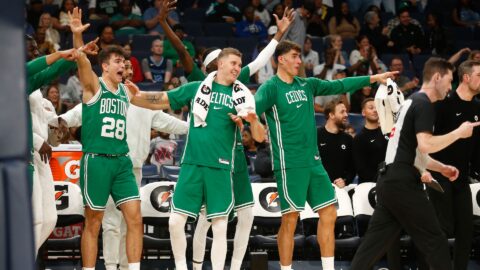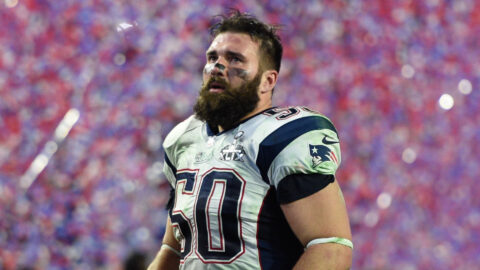 After 17 years in the National Football League, former quarterback Brad Johnson will see his health insurance expire after his fifth year in retirement. In Major League Baseball, if a player spends one day on an active roster — they don’t even have to play in the game — they receive healthcare benefits for the rest of their life.
After 17 years in the National Football League, former quarterback Brad Johnson will see his health insurance expire after his fifth year in retirement. In Major League Baseball, if a player spends one day on an active roster — they don’t even have to play in the game — they receive healthcare benefits for the rest of their life.
What other point needs to be made?
The NFL technically operates as a nonprofit organization. However, this is a complete joke that likely allows the league and its owners to decline to pay its fair share in taxes and give its executives excessive multimillion dollar salaries. In reality, the league’s teams’ collectively brought in a profit of about $9 billion during the 2011 season.
Yet the league, by its own actions, doesn’t care about the well-being of the players off the backs of which those wearing suits earn their profits. While Roger Goodell sees his salary increase from $9.9 million in 2009 to $20 million by 2019, according to Business Insider, the league continues to treat its players as indentured servants, to whom it owes little to nothing after they retire.
On Wednesday, USA Today published an account of Johnson’s life in retirement, and it isn’t necessarily pretty. Though the former Vikings and Buccaneers quarterback claims that he never 0nce suffered a concussion during his career, just about every other part of his body seems to be failing him. Neck, back and knee injuries — “I know (knee replacement) is coming,” he says in the article — have left him permanently limping, unable to lift heavy objects.
But here’s the thing: Johnson doesn’t blame football for his current quality of life. He says he feels that he willingly sacrificed his body for the game, and sounds content with that decision, even while enduring its aftermath.
“You’ve got to do the work,” said Johnson. “You’ve got to put in the time. Otherwise, you’ll be passed by somebody that’s better than you. If you can play, you play.”
But, at the same time, Johnson makes a very, very cogent point in the piece: Why doesn’t the NFL do more to take care of its retired players in the form of health insurance?
While the NFL has made some strides in recent years to extend health benefits to retired players, if you’re cynical enough it’s not difficult to read into these moves as a means to avoid potential future lawsuits regarding head injuries. These changes include benefits only to players who’ve suffered “neuro-cognitive” injuries or other maladies that leave them unable to work.
But the question remains: Is the NFL such a morally devoid organization that it cares more about its bottom line than making a monetary sacrifice to take care of the players who have sacrificed their quality of life for the league’s profit?
“A lot of it to me is about the years of service, how much wear and tear they actually took and injuries that have happened,” said Johnson. “I know how I feel now every day that I wake up. I wish there was health insurance depending on years of service.
“I do think the league has done a better job as far as providing better benefits. I don’t know if they can backtrack for all the guys who played. But for the future players, I wish they would extend those benefits.”
Information on healthcare benefits in any of the major pro sports leagues is actually hard to come by. But again, for the sake of sourcing, according to Business Insider and the Bryan Cave law firm, MLB players get lifetime healthcare after just one day on an active 25-man roster. In 2011, the NFL instituted a way to get free healthcare for retired players — but only for those ages 50 to 75 years old.
There are sure to be those who will take the callous view of this information, and ask why a retired NFL player — even those who made multiple millions during their career — deserves a free service that the rest of us schmucks pay for out of pocket or pay in to only when we’re gainfully employed.
The answer is simple: The brutality of the NFL inflicts lifetime health issues on its players, regardless of whether or not they understand this going in, and as a multibillion dollar industry, should have a moral obligation to take care of its retirees.
If there are no players, there’s no league to make profit for the men in suits. Yet those suits would rather self-congratulate by paying Goodell over $10 million in 2012, paying NFL Network head Steve Bornstein more than $12 million, bringing in former commissioner Paul Tagliabue for more than $3 million as a consultant for some reason or finding it necessary to rent a space on Park Avenue in New York City for more than $11 million.
Of course, there’s no direct relationship here, and executive salaries likely have no bearing on the league’s healthcare benefits. But, on an outward level, it just looks insanely callous and out-of-touch for a league to profit from players, subsequently throw them out into the cold and all the while increase the salaries of the executives.
Shame on the NFL for rewarding its eminently replaceable suits before taking care of its irreplaceable on-field talent — those who actually need the help.



